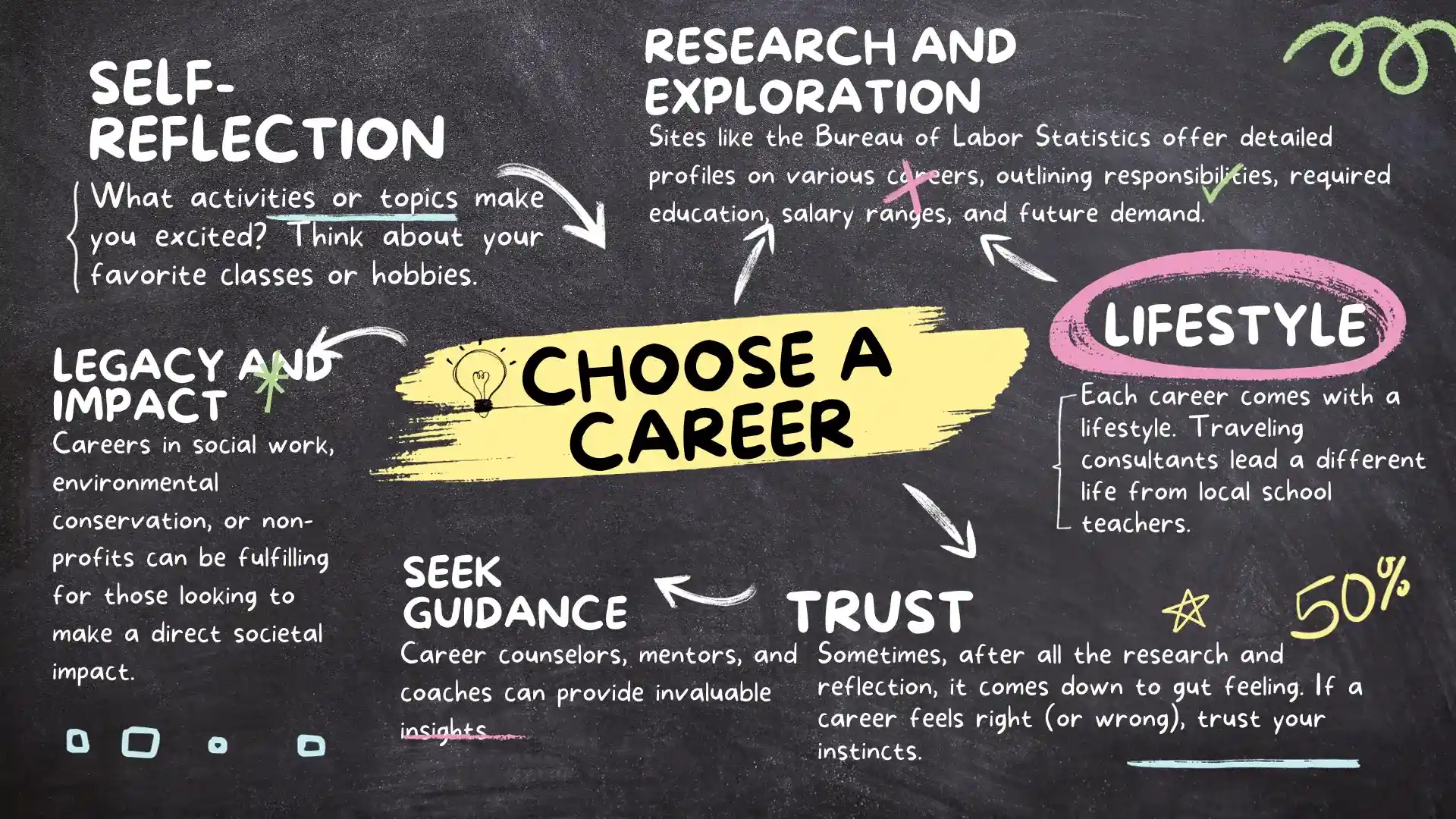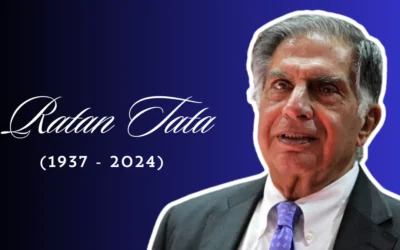How to Choose a Career: 15 Most Crucial Things to Consider. Selecting the right career can be a pivotal decision in one’s life. It’s not just about choosing a job; it’s about finding a professional pathway that aligns with your skills, passions, values, and aspirations for the future. The journey to identifying the ideal career often requires more than just introspection; it mandates a comprehensive understanding of the job market, future trends, and personal strengths. In this guide, we delve deep into the 15 most crucial factors to consider, ensuring that your career choice is both fulfilling today and promising for tomorrow.
Key Takeovers:
- Self-reflection is Paramount: Before diving into any profession, it’s essential to deeply understand oneself. Delving into your inherent passions, honed skills, and core values can illuminate a path that resonates with who you truly are, positioning you for both success and fulfillment.
- Understanding Market Dynamics: In our rapidly changing world, a grasp of the job market’s ebbs and flows is crucial. By aligning your career choices with the current demands and trends of the industry, you’re not just securing a job, but ensuring its relevance and longevity in the years to come.
- The Balance of Work and Life: Beyond the paycheck and the title, it’s vital to contemplate the lifestyle a chosen career demands. Achieving a harmonious balance between your professional commitments and personal aspirations is the cornerstone of holistic well-being.
- Continuous Learning and Growth: In today’s dynamic professional landscape, resting on one’s laurels is not an option. The commitment to continuous learning, upskilling, and adaptability is the key to thriving and ensuring long-term success in any field.
- Networking and Mentorship: As you tread the path of your chosen career, the importance of building connections cannot be overstated. Engaging with seasoned professionals, seeking mentorship, and drawing from their experiences can provide an invaluable compass, offering direction and clarity in your journey.
How to Choose a Career: A Comprehensive Guide
Selecting a career path is a significant decision that can influence our happiness, financial stability, and overall life trajectory. With the myriad of career options available, it’s easy to feel overwhelmed. But with careful consideration, research, and introspection, you can find a career that aligns with your personal and professional goals. Here’s a step-by-step guide to help you in this important journey.
1. Self-Reflection
Before diving into potential careers, it’s essential to understand yourself.
- Interests: What activities or topics make you excited? Think about your favorite classes or hobbies.
- Values: Do you prioritize work-life balance, high earning potential, helping others, or creativity?
- Skills: Are there tasks or activities at which you naturally excel?
- Personality: Consider taking a Myers-Briggs Type Indicator or a similar personality test. This can provide insights into the work environments that may suit you.
2. Research and Exploration
Once you have a clearer understanding of your preferences:
- Career Profiles: Sites like the Bureau of Labor Statistics offer detailed profiles on various careers, outlining responsibilities, required education, salary ranges, and future demand.
- Job Shadowing: This provides a real-world glimpse into a day in the life of a professional in a particular field.
- Interviews: Talk to individuals who are currently in careers you’re considering. They can provide first-hand insight and advice.
3. Consider Future Market Trends
With the rapid advancements in technology and shifts in the global market, some careers might be in higher demand in the future. Consider fields related to renewable energy, technology, healthcare, and anything that addresses future global challenges.
4. Education and Qualification
- Required Education: Some careers might require advanced degrees or certifications. It’s important to be aware of these requirements early on.
- Skill Development: Even if a career doesn’t require formal education, gaining additional skills or certifications can be beneficial.
5. Evaluate the Lifestyle
Each career comes with a lifestyle. Traveling consultants lead a different life from local school teachers. Consider the daily routines, travel requirements, working hours, and any other lifestyle impacts associated with potential careers.
6. Practicality
- Financial Aspects: Consider the earning potential and job security of the career. Will it allow you to live comfortably and achieve your financial goals?
- Geographical Restrictions: Some careers might require relocating. Are you open to moving, or do you have a preference for staying in a particular region?
7. Take a Test Run
Before fully committing:
- Internships and Part-time Jobs: These provide a hands-on experience of the job and help you assess if it’s the right fit for you.
- Freelancing: In some industries, you can start working on small projects to get a feel of the work.
8. Stay Adaptable
The world is constantly evolving, and so are job markets. It’s perfectly okay to change directions if you feel a career isn’t the right fit. Continuous learning and adaptability are key.
9. Seek Guidance
Career counselors, mentors, and coaches can provide invaluable insights and direction based on their experiences.
10. Holistic Well-being
When considering a career, it’s also crucial to think about your overall well-being.
- Mental Health: Some jobs can be incredibly stressful or demanding. Ensure that you consider how a profession may impact your mental well-being and make sure you have coping mechanisms in place.
- Physical Health: Jobs that require long hours sitting, heavy lifting, or extensive travel might have implications for your physical health. Understanding these implications can help you make a well-informed decision.
11. Work Environment and Culture
- Company Values: If a company’s values don’t align with yours, you might find it challenging to work there, regardless of the role.
- Team Dynamics: The people you work with can greatly influence job satisfaction. Look for teams and leaders that support and inspire you.
- Remote vs. On-site: The rise of remote work has introduced a new factor in career choices. Determine if you prefer working from home or if you thrive more in an on-site environment.
12. Growth and Advancement
- Career Ladder: Some professions have a clear progression path, while others might offer a more flexible trajectory. Think about where you want to be in 5, 10, or 20 years and see if the career aligns with those goals.
- Continuous Learning: Does the career require (or offer opportunities for) continuous learning and skill development? Staying updated and upskilled is essential in today’s rapidly changing world.
13. Work-Life Integration
Rather than just work-life balance, consider how work integrates with your life. Does it allow you the flexibility to pursue hobbies, spend time with family, and maintain a fulfilling personal life?
14. Legacy and Impact
Consider the mark you wish to leave behind:
- Social Impact: Careers in social work, environmental conservation, or non-profits can be fulfilling for those looking to make a direct societal impact.
- Innovation: If you’re driven by innovation, careers in research, tech startups, or product development might appeal to you.
15. Trust Your Instincts
Sometimes, after all the research and reflection, it comes down to gut feeling. If a career feels right (or wrong), trust your instincts. They often capture subtle cues that your conscious mind might overlook.
Final Thoughts
Choosing a career is a profound journey of understanding oneself in relation to the world of work. By marrying introspection with external research, you craft a pathway that resonates with who you are and what you want from life. It’s essential, however, to remember that career choices are not always final. The path you embark upon can twist and turn, offering opportunities for change, growth, and reinvention. Embrace each phase with an open heart and mind, and you’re sure to find success and satisfaction.
Mistakes To Avoid While Choosing A Career
Choosing a career path is one of the most significant decisions we make in our lives. Yet, many people rush this decision or base it on the wrong criteria, leading to dissatisfaction later on. Here are some common mistakes to avoid when selecting a career:
- Following the Crowd: Just because a particular career is trendy or popular doesn’t mean it’s right for you. Everyone’s strengths, interests, and values are unique.
- High Earnings Obsession: While a well-paying job can be a factor in career decisions, making it the sole focus can lead to long-term unhappiness if the job doesn’t align with other personal values or interests.
- Ignoring Passion: Choosing a career without passion or interest can lead to burnout and dissatisfaction.
- Overvaluing Others’ Opinions: While seeking advice is essential, the final decision should be yours. Sometimes, parents, friends, or peers might have well-intentioned but misdirected suggestions for you.
- Not Doing Enough Research: Jumping into a profession without fully understanding the day-to-day responsibilities, growth opportunities, or challenges can lead to regret.
- Neglecting Work-Life Balance: Overlooking the lifestyle a career might lead to can be detrimental. Some professions might require long hours or frequent travel, which might not align with your personal life goals.
- Avoiding Self-Assessment: Not taking the time to evaluate your strengths, weaknesses, interests, and values can lead you down the wrong path.
- Being Afraid of Commitment: While it’s okay to change your mind, constantly hopping between careers without giving one a proper chance can hinder professional growth.
- Underestimating Education and Training: Entering a field without understanding its educational or training requirements can lead to roadblocks later.
- Overlooking Company Culture: Even if a career seems perfect, the culture of specific companies or industries can significantly impact job satisfaction.
- Not Considering Long-Term Growth: Picking a career based only on its immediate benefits without considering long-term growth and advancement can limit future opportunities.
- Resisting Change: In today’s rapidly evolving world, adaptability is crucial. Choosing a career and sticking to it rigidly, even when it’s clear it’s not the right fit, can be detrimental.
- Ignoring the Global Perspective: In a globally connected world, understanding international trends, markets, and opportunities can offer a broader range of career options and insights.
- Not Seeking Mentorship: Not leveraging the experience and insights of those who have walked the path before you can be a missed opportunity for guidance.
- Avoiding Real-World Experience: Basing career decisions purely on theoretical knowledge without seeking internships, job shadowing, or part-time opportunities can lead to misconceptions.
A successful and fulfilling career is a blend of passion, skill, and practicality. While it’s impossible to predict every turn and twist your professional life might take, avoiding these common mistakes can set you on a more informed and satisfying path. Remember that career decisions aren’t set in stone; there’s always room to pivot, learn, and grow.
How to Choose an Ideal Career with a Better Future
In the evolving job landscape, selecting a career that not only aligns with your passion but also promises a bright future is crucial. Here’s a systematic approach to choosing such a career:
1. Self-Assessment
- Skills and Strengths: Identify what you’re naturally good at. This often indicates areas where you can excel professionally.
- Interests: What excites or engages you? Careers aligned with your interests tend to be more fulfilling.
- Values: Understand what’s essential for you in a job – whether it’s making an impact, achieving work-life balance, or earning a high salary.
2. Market Research
- Emerging Industries: Look into sectors that are on the rise. Fields like renewable energy, AI, biotechnology, and digital health are gaining momentum.
- Job Longevity: Consider the future of the profession. For example, roles being automated might not offer long-term security.
- Economic Indicators: Research industries that are resilient to economic downturns or those expected to thrive in various economic scenarios.
3. Educational and Training Pathways
- Relevant Qualifications: Determine if the careers you’re considering require specific degrees or certifications.
- Skill Development: Invest in continuous learning. The job market values individuals who can adapt and acquire new skills.
4. Global Trends and Geopolitical Shifts
- Global Demand: Some professions might have higher demand in different parts of the world. Being open to relocation can expand opportunities.
- Cultural Adaptability: With the global marketplace and remote work dynamics, having the ability to work with diverse teams can be an asset.
5. Work Environment and Flexibility
- Company Culture: Research companies that align with your values and offer a conducive work environment.
- Remote Work: Consider if the career offers flexibility in terms of working remotely, which is becoming a norm in many industries.
6. Potential for Growth
- Career Ladder: Look into the advancement opportunities within the profession. It’s beneficial if there’s a clear progression path.
- Continual Learning: Choose a field that encourages ongoing professional development.
7. Seek Expert Insights
- Networking: Connect with professionals in your desired field. They can provide first-hand insights about the industry’s future and its nuances.
- Career Counselors: These experts can guide you based on your profile and the future of various industries.
8. Work-Life Integration
- Lifestyle Implications: Does the career support your desired lifestyle? Think about work hours, travel commitments, and any other relevant factors.
- Balance and Well-being: Consider the mental and physical demands of the job. Ensure it doesn’t compromise your well-being.
9. Test the Waters
- Internships: Before fully committing, internships offer a glimpse into the industry.
- Part-time Work: Engaging in part-time roles or freelancing can help you understand if you genuinely enjoy the work.
10. Stay Updated
- Industry News: Regularly read industry-specific news and journals to stay updated on market trends.
- Continuous Skill Enhancement: Technologies and methodologies evolve. Regular upskilling ensures you remain relevant.
Choosing an ideal career with a promising future requires a blend of introspection, market understanding, and readiness to adapt. It’s not just about finding a job; it’s about finding a profession where you can thrive, evolve, and build a better tomorrow. Remember, the journey to an ideal career is ongoing; as the world changes, staying informed and adaptable will ensure you always have a place in the future job market.
FAQs on Choosing a Career
Q: How do I determine which career aligns best with my strengths and interests?
A: Start with a self-assessment, often available through career counselors or online platforms. These evaluations analyze your skills, passions, and values. Additionally, seeking real-world experiences through internships or job shadowing can provide valuable insights into potential careers.
Q: Are high-demand industries always the best choice for a stable career?
A: While high-demand industries can offer more job opportunities, it’s essential to consider personal alignment and job satisfaction. An industry might be booming, but if it doesn’t resonate with your values or interests, it might not be sustainable for you in the long run.
Q: How can I stay updated about the latest trends and demands in the job market?
A: Regularly reading industry-specific journals, attending webinars, participating in professional networking groups, and engaging in continuous learning courses can keep you updated. Platforms like LinkedIn also offer insights into market trends and industry demands.
Q: I’m considering a career change later in life. Is it too late?
A: It’s never too late for a career change! While transitioning might come with challenges, your prior experiences can offer unique perspectives and skills in a new field. Continuous learning, networking, and being open to starting in entry-level positions can facilitate a smoother transition.






















































0 Comments